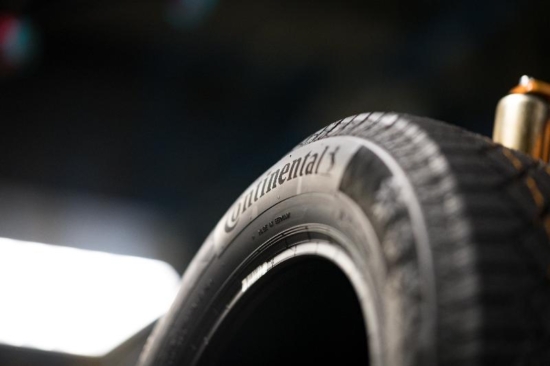Continental to use recycled PET bottles in tyre production
 A typical set of car tyres will contain material from at least 60 PET bottles (Photo: Continental)
A typical set of car tyres will contain material from at least 60 PET bottles (Photo: Continental)
We’re used to encountering yarn spun from recycled polyethylene terephthalate (PET) bottles in clothing and soft furnishings, but from next year motorists will be able to buy Continental tyres containing this material. Continental will use PET-sourced polyester yarns in the construction of tyre casings and says these can “completely replace” conventional polyester. It will present a concept tyre built upon a PET polyester casing at the IAA Mobility show in Munich this September.
Together with its cooperation partner and supplier Otiz, a fibre specialist and textile manufacturer, the tyre maker has developed a technology to recycle PET bottles that dispenses with previously necessary intermediate chemical steps and results in a polyester yarn suited to the high mechanical demands that tyre use will place upon it. Continental comments that this upcycling turns a used bottle into a “high-performance” PET material.
The company tells us it is “currently examining” the precise form that its strategy for introducing this material will take; in theory, it could be used in series production around the world from next year, however, Continental will not mix it with virgin PET within the same tyre.
“As early as 2022, we will be able to use material obtained from recycled PET bottles in tyre production. In our innovative recycling process, the fibres are spun from recycled PET without having to break the material down into its components beforehand,” says Dr Andreas Topp, who is responsible for materials, process development and industrialisation in Continental’s Tires business area. “With the use of recycled polyester yarn, we are taking another important step in the direction of cross-product circular economy.”
Performance comparable with virgin PET
The recycling process begins with bottles being sorted, their caps removed and mechanical cleaning. After mechanical shredding they are melted down and granulated; this is followed by solid-state polymerisation and a modified spinning process. “Our modified manufacturing process enables us to obtain polyester yarn for tyre construction from PET bottles without any polymerisation process from monomers,” explains Dr Derren Huang, chief of research and development at Otiz.
Continental has conducted laboratory and tyre tests, and these show that secondary raw material fibres perform equally well as the fibres it has used up to now. They have the same quality as virgin PET, are just as stable, and are particularly suitable for tyres due to their breaking strength, toughness and thermal stability. It can therefore be used in all types of casings where polyester is currently used, the tyre maker confirms.
Conventional PET has long been utilised as a material in car tyre construction because it retains its shape even under high loads and temperatures and thus ensures safety at all driving speeds. Continental shares that the switch to recycled PET “conserves valuable resources” in tyre construction: A conventional passenger car tyre consists of around 400 grammes of polyester yarn. This means that more than 60 recycled PET bottles can be used for a complete set of vehicle tyres.
Circular economy integral to Conti’s sustainability strategy
Recycling is becoming increasingly important in tyre design, development and production. By 2050 at the latest, Continental aims to successively use 100 per cent sustainably produced materials in its tyre products. The use of recycled PET brings the tyre maker a step closer to this goal.
“For us, waste is tomorrow’s production material as we see the model of the future in circular economy. Continental’s commitment to actively shaping and driving this transformation offers us a head start for our future business and thus for our future viability,” says Claus Petschick, head of sustainability within Continental’s Tires business area. “Our ambition is clear: By 2050 at the latest, we want to completely close our product and resource cycles together with partners and suppliers.”
Continental declined to comment when asked how recycled PET yarn compares with virgin PET in regards to cost.



Comments